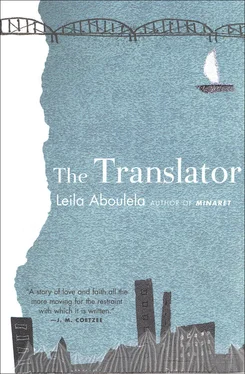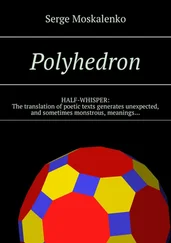Yasmin’s husband, Nazim, worked some of the time on the oilrigs off-shore. When he was away, she tended to meet Sammar at the weekends. Yasmin had a car and Sammar liked driving around, listening to the radio, seeing parts of the city she had not seen before. She wished she could have a car and escape the weather.
That Saturday, they went to the library because Yasmin, now ten weeks pregnant, wanted to look at baby books. There were shelves of books about pregnancy, birth, breastfeeding. The library was warm, full of people, full of books. There were books on Caesarean birth, abortions, infertility and miscarriage. Sammar had miscarried once, a year after her son was born. She remembered the night, fateful and climactic, coming after days of anxiety, days of awareness that this pregnancy was not going right, something was wrong. She remembered Tarig being calm, warm and sure of what to do. She remembered him on his hands and knees mopping the bathroom floor, her womb that had fallen apart.
There was gratitude between them. Gratitude cushioned the quarrels, petty and deep. It levelled the dips in affection. Sometimes this gratitude came to her in trances and in dreams. Dreams with neither settings nor narratives, just the feeling, distilled.
‘I can only take six books,’ Yasmin was saying. ‘If you had a card I could borrow on yours. That’s an idea. Let’s get you a card.’
‘No, some other time.’ She did not like doing things impulsively, without warning. She looked at the queues which stretched out from the desk, the librarians running pens over the barcodes on the books. They made her nervous. She tried to sound convincing. ‘You’ll never read more than six books in a month. Six is enough.’
But Yasmin insisted, giving her a lecture on how a library card was a right. ‘You pay tax, don’t you?’ she said and told her how a Nigerian woman with three children had lived in Aberdeen for seven years before finding out that she was entitled to Child Benefit. ‘No one told her,’ Yasmin screeched in a whisper.
Twelve books on pregnancy made their way to the counter. Yasmin did all the talking. Sammar felt like a helpless immigrant who didn’t know any English. She imagined the English words lifting away from her brain, evaporating, forming a light mist. It was one of the things that Mahasen had said to her the night of their quarrel, almost trembling with anger, fluent with righteousness. The night when Sammar had asked her permission to marry Ahmad Ali Yasseen. An educated girl like you, you know English… you can support yourself and your son, you don’t need marriage. What do you need it for? He started to talk to me about this and I silenced him. I shamed him, the old fool. ‘He’s religious,’ Sammar had choked the words, ‘he feels a duty towards widows…’ He can take his religiousness and build a mosque but keep away from us. In the past, widows needed protection, life is different now. She had wanted to say something in reply but the words stuck in her throat like dough.
‘Rae’s book,’ said Yasmin, just as they were leaving, ‘did you see it? I’m sure it’s here. Nobody reads these kind of things.’ With their twelve books they went back to the History section and searched, finally finding The Illusion of an Islamic Threat upstairs, classified under Politics. On the back Sammar read in italics what others said about it, Brings a new understanding to the turbulent situation in the Middle East … — Independent on Sunday. Isles sets out to prove that the threat of an Islamic take-over of the Middle-East is exaggerated… his arguments are bold, his insights provocative … — The Scotsman.
They talked about him when they left the library, their voices carrying above the sound of the traffic and the cold wind. Sammar wanted to know about his ex-wives. The first, Yasmin said, was married now and living in Wales. She belonged to the distant past, Yasmin had never met her. The second, the mother of the daughter who was in boarding school in Edinburgh, worked for the World Health Organisation in Geneva. They used to live in Cults, a nice big house. Then he moved to a flat in town.
Yasmin drove erratically, the books slid and parted in the back seat. She parked in a tree-lined street, in a part of town that was unfamiliar to Sammar. ‘This is where he lives,’ she said. ‘I’ve come here often with Nazim. It’s good that you’re with me, I can give him these faxes that came for him yesterday after he went home. He’s waiting to hear any moment now from the anti-terrorist programme. They’re going to take him on as a consultant.’
‘We can’t do that, it’s not right,’ said Sammar, ‘give them to him on Monday…’ But Yasmin was already unclasping her seat-belt, switching the heating off, pulling up the hand brake. ‘We’re together,’ she answered, ‘it’s not as if either of us is on her own.’
‘He might not be in anyway,’ Sammar went on. Yasmin was out of the car, Sammar still tied in by her seat-belt. It was getting dark, the clouds were plastered purple against the sky, the sun far away.
When Rae opened the door, fur brushed against Sammar’s knees. It was a large black cat which made its way indoors with them. Sammar was wary of cats. When she was young stray cats had sneaked indoors and shocked her by jumping out of cupboards or from underneath the stairs. They were savage cats, their ribs visible against matted, dirty fur. Some had a black hole instead of an eye, some had stumpy legs, amputated tails. While she screamed, they ran back and forth in the room, desperately seeking an exit. It seemed to her that they clambered the walls, clawed the paint, cried furiously like she was crying, to get out of the trap they had voluntarily entered and back to the outdoor life they knew.
Tarig had a story about stray cats, the ones that lived around the hospital. ‘Their favourite meal,’ he said, ‘comes every time a baby is born. They wait around the dustbins, one juicy placenta drops in, and you should see how they fight for it!’ He liked to tease her with gory hospital stories. Laugh at the expression on her face.
Rae’s cat was slow and wellfed. She walked, glossy and serene, around the room while he greeted Yasmin and Sammar and showed them in. ‘What happened to your hair!’ was the first thing Yasmin said. His hair was cut so short that it stood up from his head like spikes. He laughed and patted his head, saying, ‘I guess the barber was over-zealous this time.’ He looked different from how he was at work. He was not wearing a tie and had not shaved. It seemed to Sammar that the flat was not very large. The room they sat in was attached to the kitchen. Large bay windows overlooked the road and on the other side of the room, over the kitchen sink, was another window with yellow blinds. There were books lined under the window and the weekend supplement spread out on the floor.
The cat climbed up and sat on Sammar’s knees. She did not know what to do, she had not looked at a cat closely like this before, not seen the yellow slits of its iris, the shine on its perfect black coat. She stroked it awkwardly and listened to Yasmin and Rae talking about the faxes, the weather outside, the headlines on the newspaper that Rae now picked up from the floor and folded away. ‘I loathe all this fuss about the Royals,’ Yasmin was saying. ‘Loathe’ was another of the words that Yasmin often used. ‘I loathe this shitty British weather.’
Rae went to make tea. The cat left Sammar’s lap and she began to look around at the rugs on the wall, the copper plant pots on the floor. There was a photograph of Rae’s daughter on top of a shelf of books. She looked like she was around ten or eleven and was riding a horse. She wore boots and a cap with straps along her chin. Sammar imagined the child’s mother with that same long brown hair, courageous too, working for the WHO, an important job, doing good, helping people.
Читать дальше












